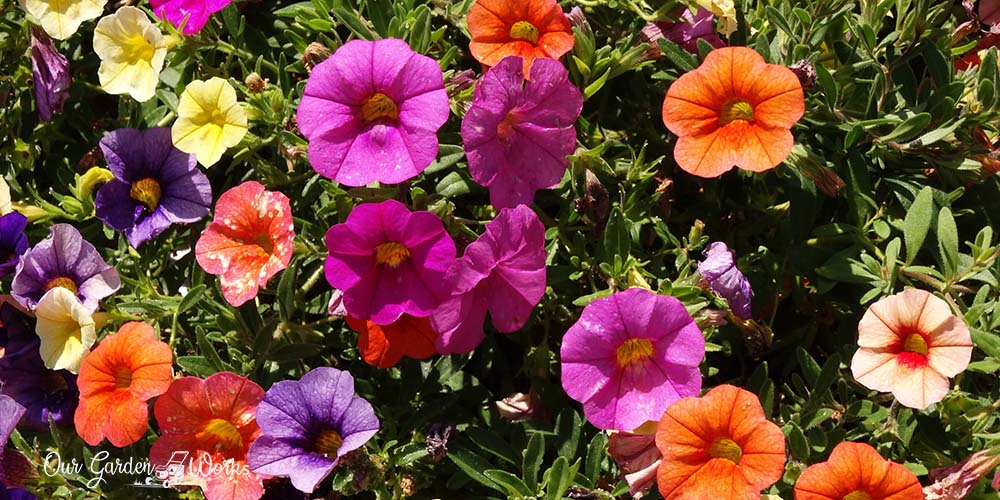Petunias are usually the least type of plant that you will consider fertilizing. It is low-maintenance and does not need too much tending. However, to boost its flower power and extend its bloom development until the end of the growing season, it’s best to give them a boost using the best fertilizer for petunias.
In A Hurry, Our Top Picks:
A well-fed petunia plant can give you bigger blooms that don’t wither until the first frost. It may sound superficial but the ability of these bright and fragrant petunias might surprise you.
Petunias are categorized by their growing behavior, which requires different strategies for fertilizing them.
(You could use the table of contents below to jump to the sections that are most important to you.)
The 4 Types of Petunias and How To Fertilize Them?
Before we run down the fertilizers ideal for petunias, it is essential to know the types of petunias and their ideal feeding schedule.
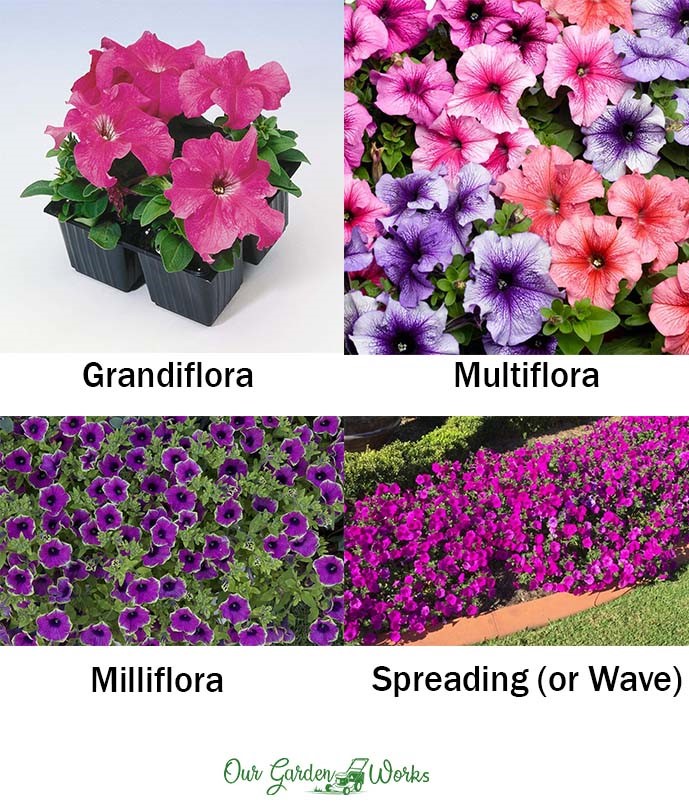
- Grandiflora: This group of petunia has the largest flowers and the oldest species among other varieties. They require monthly feeding and frequent watering. Unlike other varieties, their flowers are quite delicate and often fall easily as the weather changes.
- Multiflora: These are the types of petunias with exploding numbers of small blooms that grow in a compact behavior. The flowers hold up more than Grandiflora petunias on rainy days. They need monthly feeding throughout the growing season.
- Milliflora: This type of petunia are varieties that produce a ton of mini flowers. Its grandiose display of flowers makes it the best option to plant on hanging baskets and fence planter boxes. Monthly feeding can suffice its nutrient needs.
- Spreading or wave: These unique petunia varieties are popular as fast growers that drape over planter boxes and pots. Unlike bush-type petunias, they spread like wildfire and require weekly feeding and watering.
Petunias are the type of plants that have some difficulty absorbing iron from the soil. Iron is an essential nutrient that helps plants develop more chlorophyll and produce vibrant flowers.
So, a fertilizer with iron and other micronutrients can be considered the best fertilizer for petunias that are dying, sick, or recovering from pest damage.
For maintaining the health of petunias, a well-balanced fertilizer is enough. In this post, we will share the best fertilizers for petunias that can treat nutrient deficiencies and help them have long-lasting blooms.
The 10 Best Fertilizers For Petunias – Reviews in 2023
Check out the list of petunia-specific and all-purpose fertilizers ideal for nourishing petunias:
1. JR Peters Inc Jack’s Classic No.1.5 Petunia Feed
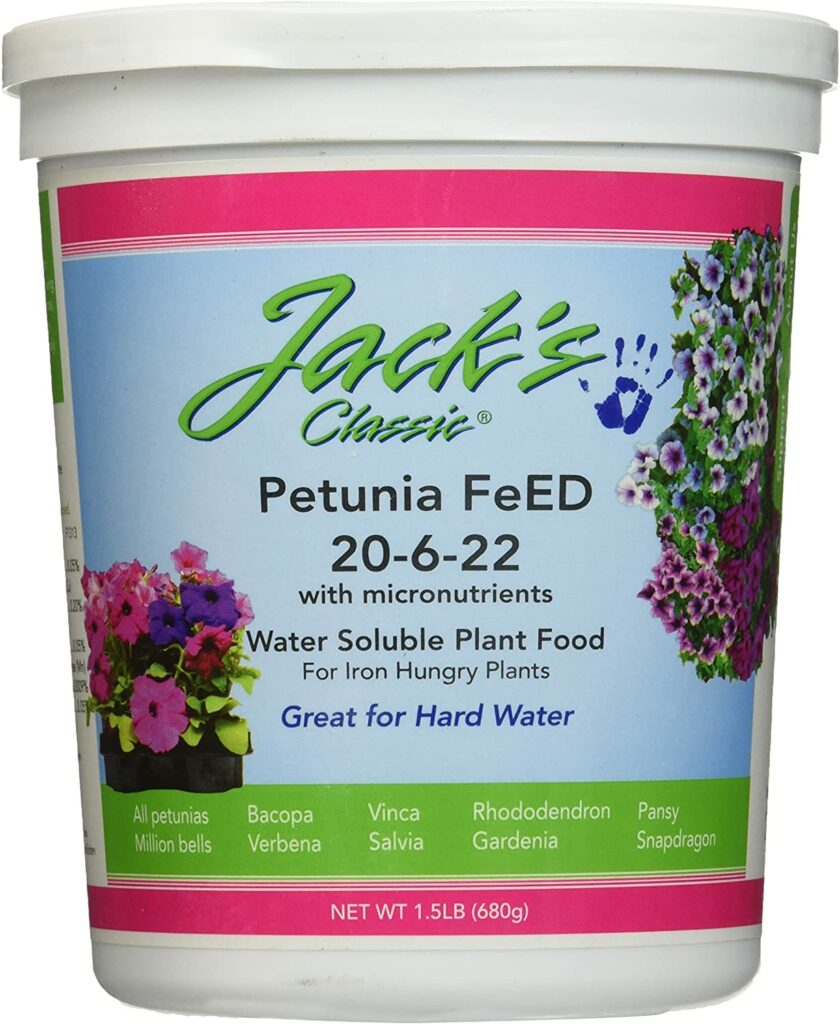
In choosing a fertilizer, you should go for the ones intended for petunias. Jack’s Classic Petunia Feed contains everything that can boost the bloom development and growth of petunias. It has an NPK ratio of 20-6-22 and has a water-soluble formula.
Liquid and water-soluble fertilizers are ideal plant food for plants because the nutrients travel faster with water in the plant system. It provides immediate results and is less prone to chemical burns.
Petunia Feed is ideal for iron-hungry plants that can’t absorb iron properly from their roots, such as:
- Petunias.
- Calibrachoa.
- Bacopa.
- Verbena.
- Vinca.
- Salvia.
- Rhododendron.
- Gardenia.
- Pansy
- Snapdragon
Though balanced fertilizers work well for petunias, Petunia Feed provides more nutrients for the full nourishment of plants. It contains extra nutrients such as:
- Magnesium 1%.
- Boron 0.02%.
- Copper 0.05%.
- Iron 0.20%.
- Manganese 0.05%.
- Molybdenum 0.00009%.
- Zinc 0.05%.
If you live in hard water areas and short growing seasons, Petunia Feed can help your plants develop tolerance and remain healthy and beautiful until the first frost. It contains the following ingredients:
- Urea.
- Ammonium sulfate.
- Monopotassium phosphate.
- Potassium nitrate.
- Magnesium sulfate.
- Boric acid.
- Iron.
- Manganese.
- Zinc.
- Copper.
- Molybdenum.
The only issue that some gardeners may hate about this product is it is a synthetic formula. Other than that, it is the best fertilizer that homeowners and professionals use to improve the blooms and extend the lifespan of petunias.
Pros
- The best fertilizer for petunias (Petunia-specific formula)
- Highly concentrated (1 tsp per gallon).
- Enhanced micronutrient package.
- Great for hard water areas.
- Better blooms within a week.
- Long-lasting blooms that last until summer.
- Ideal for reviving drying petunias.
- Value for money.
- Ideal for areas with fluctuating temperatures and short growing seasons.
- Ideal for iron-deficient petunias with yellowing leaves.
- Durable packaging.
Cons
- Pricey.
- Synthetic fertilizer.
- Contains urea.
2. Jobe’s Fertilizer Spikes For Potted Plants & Hanging Baskets
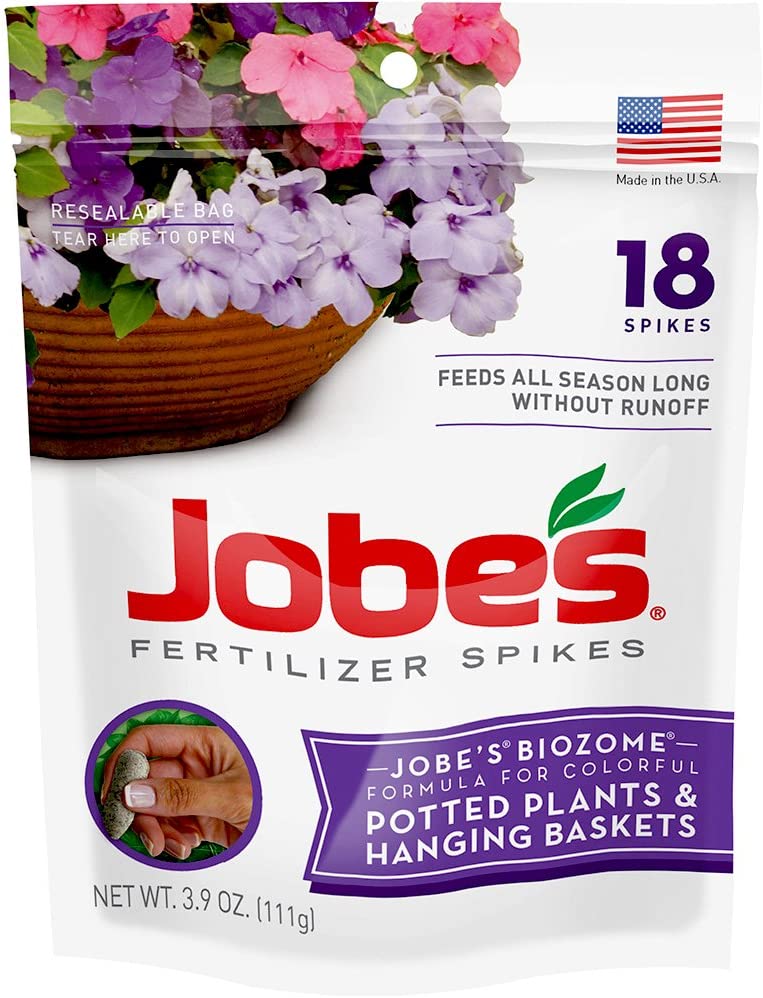
Jobe’s Fertilizer Spikes for Potted Plants are the best option for those who want a quick fix in feeding plants. Each spike contains an NPK ratio of 8-9-12 that you can stick in the soil and let feed your petunias on its own.
Jobe’s Fertilizer Spikes are ideal for petunias in pots and hanging baskets to ensure that they will receive an optimal amount of nutrition. Unlike in-ground petunias, potted petunias have a limited supply of nutrients. It is also ideal for busy gardeners that no longer have time to mix and measure the water-soluble fertilizers.
Gardeners also notice the efficiency of these spikes on petunias affected by the heatwave of summer or temperature or pest damage. It is derived from the following ingredients:
- Ammonium sulfate.
- Ammonium phosphate.
- Potassium nitrate.
- Potassium sulfate.
- Chlorine (not more than 0.2%).
Unlike other fertilizers, these spikes don’t have extra nutrients but they are still able to nourish nutrient-deficient potted petunias.
If you have petunias in 3-gallon pots and flower beds, these spikes are worth trying. Refrain from using it on small pots because it may cause chemical burns and kill the plant entirely.
Pros
- Feed plants all season without a runoff.
- Pre-measured fertilizer spikes nourish petunias at the roots.
- Easy to use.
- No wasteful runoff.
- No mess.
- No smell.
- No mixing and measuring.
- Provide a continuous supply of nutrients.
- Feeds petunias for two months.
- Provide immediate results.
Cons
- Can kill tiny delicate flowers in 1-gallon pots or any smaller pots.
3. Proven Winners’ Premium Water Soluble Fertilizer
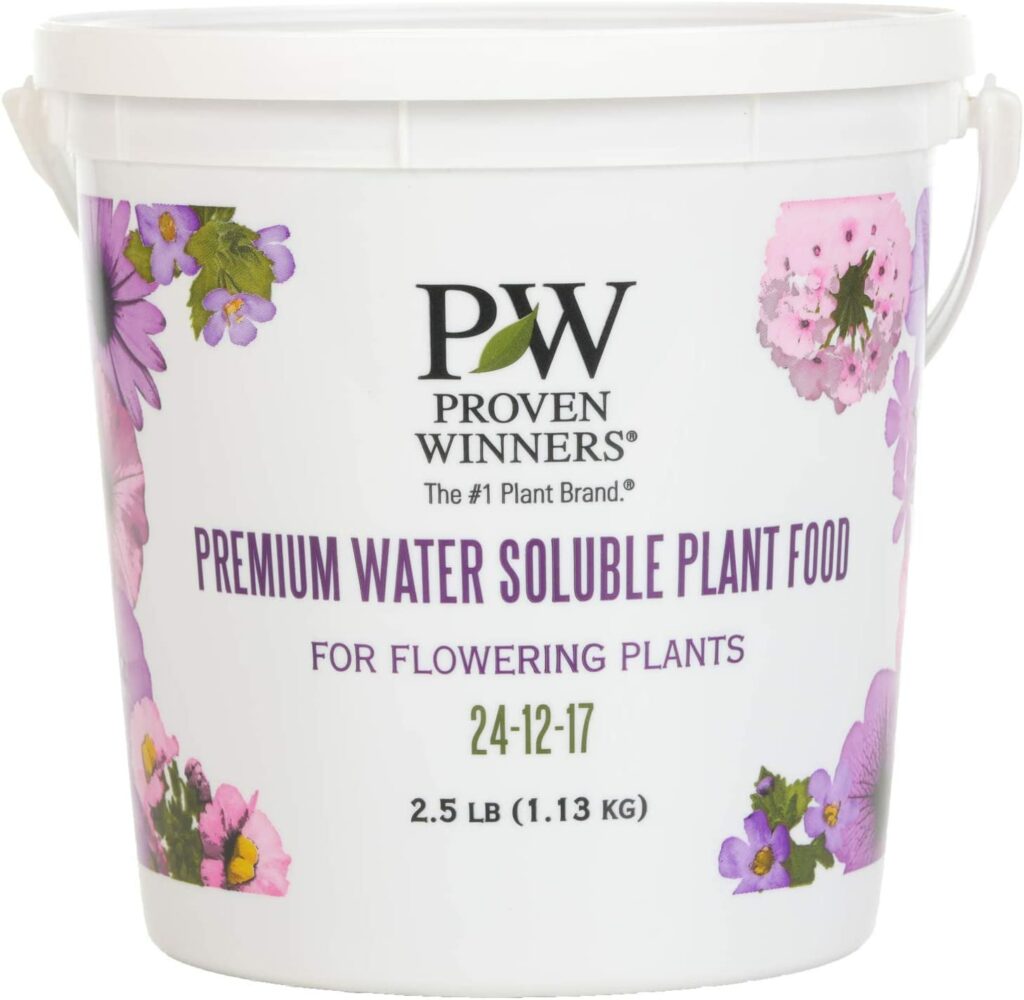
Proven Winners’ is a brand that proves that the efficiency of fertilizers doesn’t come with the popularity of the brand. It is not a mainstream brand of fertilizer but works as great as the ones you often see in big-box retailers. It is a water-soluble fertilizer with an NPK ratio of 24-12-17.
Proven Winner’s Flowering Plants Fertilizer is ideal for nutrient-deficient petunias in containers. Some gardeners also notice that it is effective for feeding SuperBells. It also contains extra nutrients, such as:
- Magnesium 0.60%.
- Boron 0.24%.
- Copper 0.05%.
- Iron 0.12%.
- Manganese 006%.
- Molybdenum 0.018%.
- Zinc 0.05%.
Proven Winners’ Flowering Fertilizer contains molybdenum that can cause skin irritation. So, you have to keep the kids and pets away from the area until it is dry. The formula of this fertilizer is derived from:
- Magnesium sulfate.
- Ammonium phosphate.
- Potassium nitrate.
- Boric acid.
- Iron.
- Manganese.
- Sodium molybdate.
- Zinc.
For gardeners who are done using mainstream brands and still get no results, Proven Winners’ Fertilizer might open their minds to using efficient but cheaper brands in the market. The only hold-up to using this fertilizer is it is made of synthetic ingredients.
Pros
- Packed with added nutrients.
- Easy to use.
- Durable packaging and a free scoop.
- Designed to prolong plant life and improve performance.
- Ideal for dull-looking petunias that work well with the deadheading technique.
- Doubles blooming strength.
- Fast results.
- Easy to dilute.
- Green up petunias after a few applications.
- Affordable.
Cons
- Synthetic fertilizer.
- Some batches have damaged seals.
4. JR Peters Inc Jack’s Classic No.1.5 Blossom Booster Fertilizer
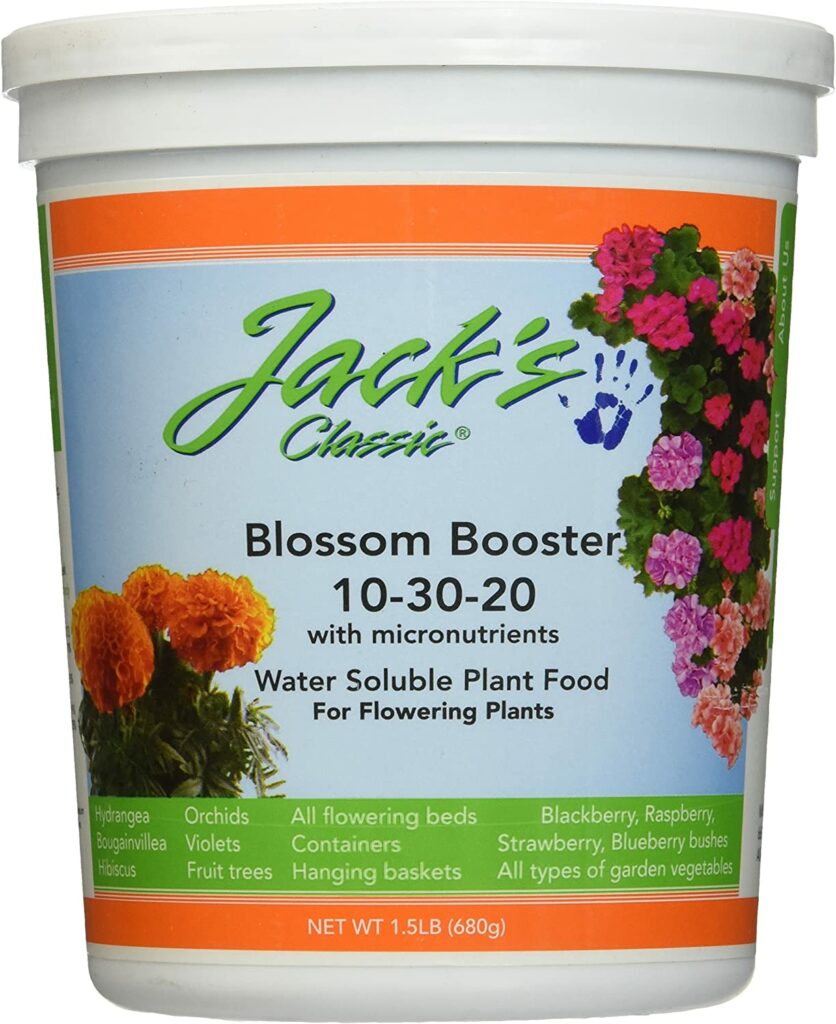
Another JR Peters made it on the list of best fertilizers for petunias for its good nourishing effect on summer-loving flowering plants. Its Blossom Booster variant has an NPK ratio of 10-3-20 that ensures the quality of flowers petunia develops. It has a water-soluble formula designed for fast absorption of nutrients.
Jack’s Classic Bloom Booster can cater to a wide variety of plants. It is exclusively formulated for plants that need a boost in bloom production either to showcase the beauty of their flowers or produce quality fruits.
In some cases, it makes an ideal plant food when transplanting petunias. You can use it on the following varieties of plants:
- Hydrangea.
- Bougainvillea.
- Hibiscus.
- Orchids.
- African violet.
- Fruit Trees.
- Blackberry.
- Raspberry.
- Strawberry.
- Blueberry.
- Geranium.
- Impatiens.
- Begonia.
- Marigold.
- Vegetables and fruits.
- Delilah’s.
- Jasmine.
- Petunia.
- Fuchsia.
- Lilies.
- Clematis.
- Foxglove.
- Gerber daisy.
- Shasta daisy.
- Stephanotis.
You can use Bloom Booster for indoor and outdoor plants. It also doesn’t have a pungent chemical smell, unlike other fertilizers. It is also packed with added nutrients, such as:
- Magnesium 0.50%.
- Boron 0.02%.
- Copper 0.05%.
- Iron 0.10%.
- Manganese 0.05%.
- Molybdenum 0.0009%.
- Zinc 0.05%.
Bloom Booster is popular in the gardening community as effective plant food that feeds plants from both leaves and roots. Gardeners also use it to help petunias recover from fungal disease, pest damage, and temperature stress during spring and summer. Its formula is derived from:
- Monoammonium phosphate.
- Monopotassium phosphate.
- Potassium nitrate.
- Magnesium sulfate.
- Ammonium phosphate.
- Potassium nitrate.
- Boric acid.
- Iron.
- Manganese.
- Ammonium molybdate.
- Zinc.
- Copper.
Like other JR Peters products, Bloom Booster also contains molybdenum which may cause mild itchiness. So, make sure to keep curious kids and pets away from the area until it is dry.
Other than that, Bloom Booster is a multi-purpose fertilizer that suits gardeners that grow varieties of fruits, vegetables, and flowering plants.
Pros
- Versatile plant food for fruits, vegetables, and flowering plants.
- Packed with micronutrients.
- Feed plants on both roots and leaves.
- Revive sick and malnourished petunias.
- Ideal for temperature-stressed petunias.
- Durable packaging.
- FREE scoop.
- Long-lasting blooms.
- Treat yellow stems and leaves in petunias (signs of nutrient deficiency).
Cons
- Synthetic fertilizer.
5. Miracle-Gro Water Soluble Bloom Booster Flower Food
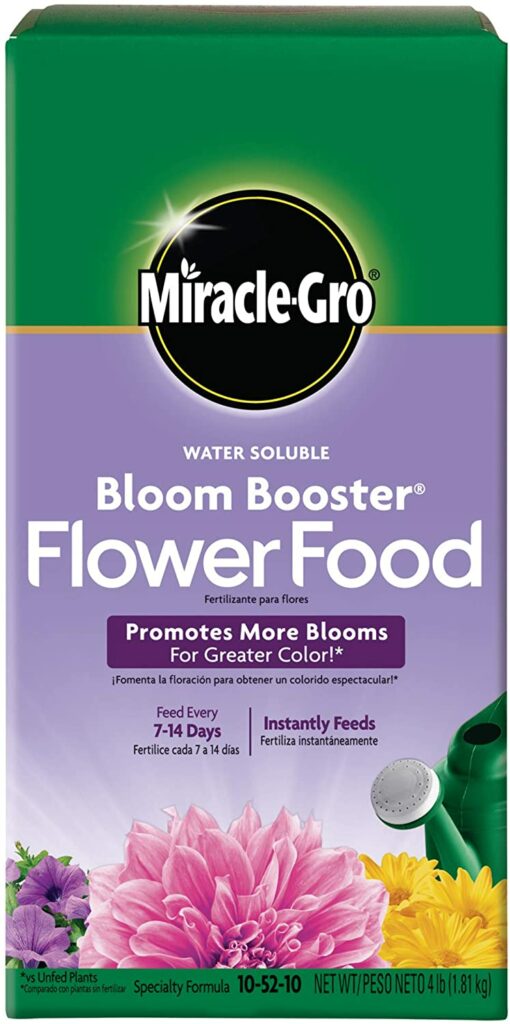
Miracle-Gro’s Flower Food is another water-soluble fertilizer ideal for feeding petunias. It has an NPK ratio of 15-30-15 that helps petunias develop bigger blooms. Gardeners use it to help petunias double up in bloom development within a week.
Flower Food is an ideal fertilizer for both perennial and annual plants like petunias. Its formula is concentrated with nutrients to feed plants in containers, window boxes, and flower beds. It is most efficient for the following plants:
- Calla Lily.
- Dahlia.
- Tulips.
- Daffodils.
- Hyacinth.
- Dianthus.
- Zinnia.
- Fuschia.
- Geranium.
- Pansy.
- African daisy.
- Shasta daisy.
If you have trust issues in trying new brands, this fertilizer will work just fine for your petunias. Its ingredients are almost at par with JR Peters but in varying amounts, including:
- Boron 0.02%.
- Copper 0.07%.
- Iron 0.5%.
- Manganese 0.05%.
- Molybdenum 0.0005%.
- Zinc 0.06%.
- Urea.
- Ammonium phosphate.
- Urea phosphate.
- Potassium chloride.
Most gardeners notice that Flower Food helps provide results within a week. They consider it one of the best fertilizers for petunias because their plants doubled their flowers more than they usually have.
On a side note, it contains urea, which other gardeners don’t want to use in their gardens. If you are one of them, this is not the ideal option for you.
Pros
- Fast results.
- Long-lasting flowers.
- Produce more blooms within one week.
- Bigger blooms.
- Affordable.
Cons
- Synthetic fertilizer.
- Caking on leaves (white residue).
6. Fox Farm Big Bloom Liquid Concentrate Fertilizer

FoxFarm Big Bloom Fertilizer is one of the unique nutrient sources for flowering plants. It is a liquid fertilizer made of bat guano and kelp that provides a new set of nutrients for petunias. It has an NPK ratio of 0.01- 0.3-0.7 and is applicable for both indoor and outdoor plants.
Since it is a liquid fertilizer, the nutrients are directly absorbed by plants. The Norwegian kelp content of this fertilizer helps plants produce more blooms with bigger sizes and an explosion of fragrance.
Aside from petunias, it is ideal plant food for the following plants:
- Rose.
- Vegetables.
- Herb.
- Fuschia.
- African violet.
- Orchids.
- Hibiscus.
- Ornamental flowering trees.
- Azalea.
- Rhododendron.
- Gardenia.
The best thing about FoxFarm Big Bloom is its organic formula and how it contributes to the environment by not using excessive chemicals that leach into the groundwater.
Gardeners can use it to revive dying and sickly petunias by using the fertilizer as a root drench. It is pricey but provides one of the best sources of nutrients for petunias.
Pros
- Organic fertilizer.
- Highly-concentrated.
- Environment-friendly.
- Kid and pet-safe.
- Extend the flowering season of petunias late into the year.
- Revives dying petunias through root drench.
- No scent.
- Easy to use.
- No mess.
Cons
- Expensive.
7. JR Peters Jack’s Classic No.1.5 All Purpose Fertilizer
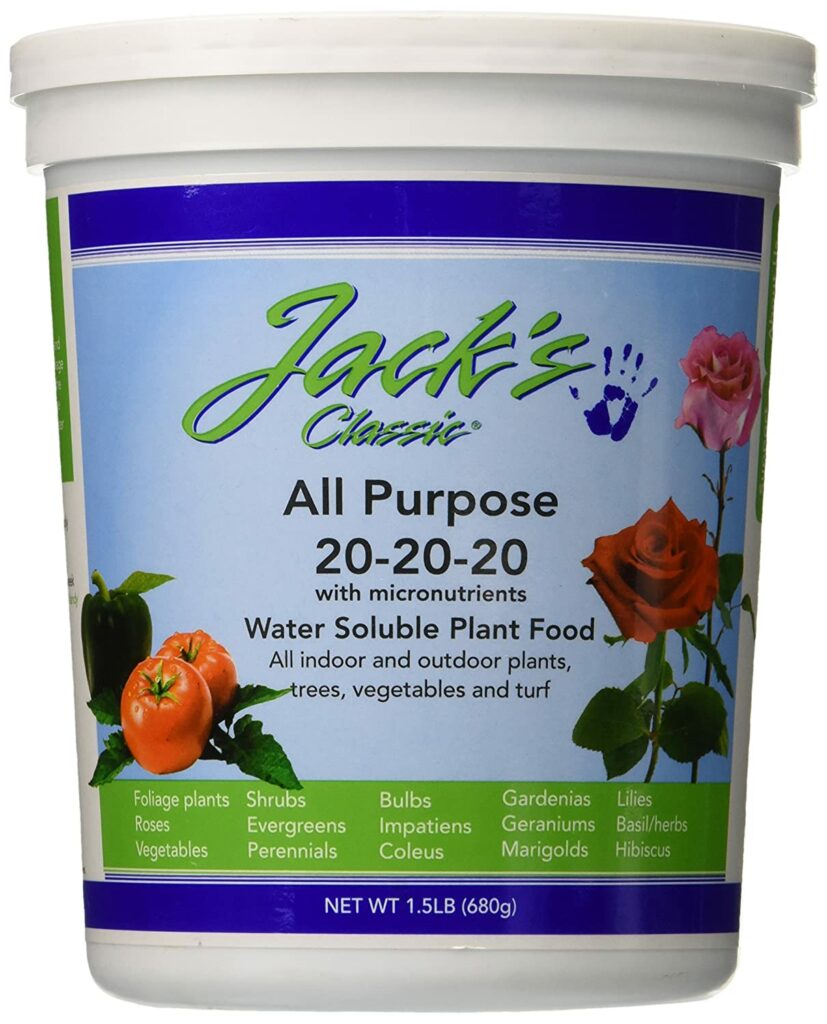
Balanced fertilizers are used by gardeners as a starter fertilizer in the soil before transplanting young petunias. Jack’s All-Purpose fertilizer is the best option for the job because it is packed with nutrients and contains an NPK ratio of 20-20-20.
Like other JR Peter fertilizers, APF has a water-soluble formula that allows easy absorption of nutrients. It is ideal for all types of plants and is mainly used by gardeners to maintain the vigor and health of petunias. It hosts added nutrients, such as:
- Boron 0.02%.
- Copper 0.05%.
- Iron 0.10%.
- Manganese 0.05%.
- Molybdenum 0.0009%.
- Zinc 0.05%.
Jack’s Classic APF is good for nourishing heavy-feeders like potted petunias. It contains a high concentration of nutrients that can help you save on fertilizers in the long run. Sometimes one application is already enough to keep petunias blooming throughout the season.
Pros
- Ideal maintenance fertilizer for petunias.
- Help revive yellowing and wilting petunias.
- Easy to use.
Cons
- Synthetic fertilizer.
8. Miracle-Gro Shake ‘N Feed All Purpose Continuous Release Plant
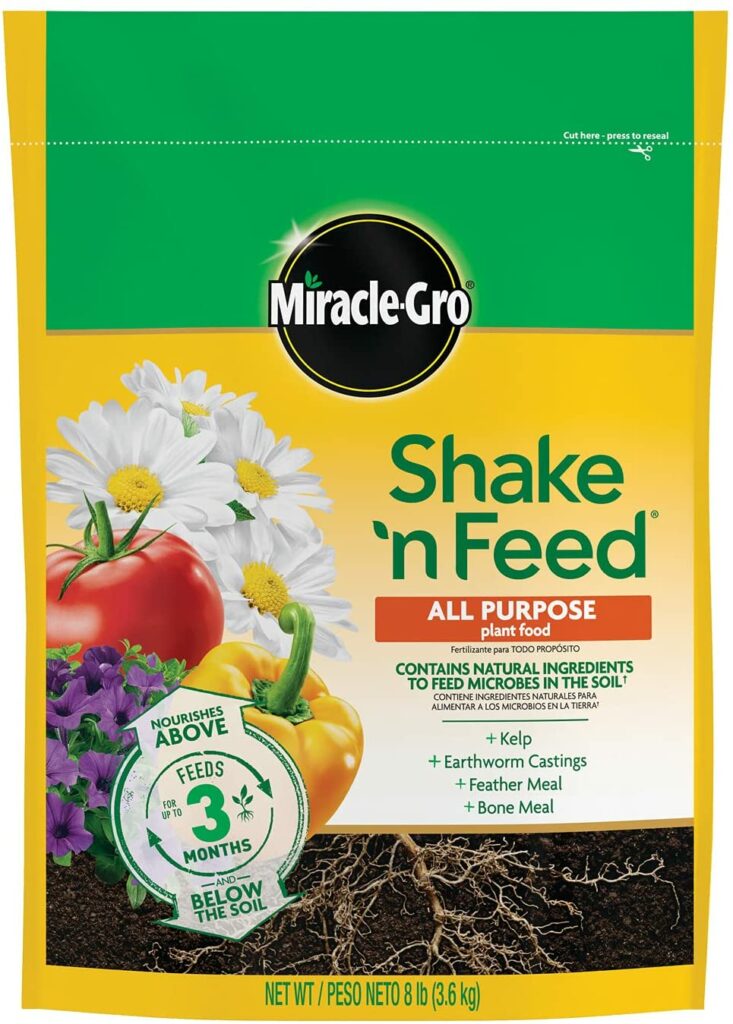
Slow-release fertilizers are also among the best fertilizers for petunias growing in hanging baskets. Container plants have limited access to nutrients, which emphasizes the need for consistent feeding provided by slow-release fertilizers like Miracle-Gro’s Shake’N Feed.
This fertilizer has an NPK ratio of 12-4-8 that can feed petunias for up to three months. The nutrients are released into the soil whenever you water your plants. The manufacturer prides itself on adding organic contents to every pellet of this fertilizer. Its ingredients include:
- Kelp.
- Earthworm castings.
- Feather meal.
- Bone meal.
- Urea.
- Ammonium phosphate.
- Alfalfa meal.
- Potassium sulfate.
- Magnesium sulfate (2.5%).
- Copper oxide (0.06%).
- Copper sulfate.
- Iron oxide (0.95%).
- Ferrous sulfate.
- Manganese oxide (0.35%).
- Manganese sulfate.
- Zinc oxide (0.12%).
- Zinc sulfate.
- Calcium (7.6%).
- Sulfur (3.2%).
Since it is an all-purpose fertilizer, Shake N’ Feed can cater to all the nutrition needs of plants. However, it is specifically effective on specific plants, such as:
- Petunia.
- Rose.
- Lily.
- Phlox.
- Rose of Sharon.
- Tulips.
- Peonies.
- Stella Dora daisy.
- Hyacinth.
- Pansy
- Hosta.
The best feature of this fertilizer is it is easy to use and time-efficient. You no longer need to mix, measure and dilute anything. It’s also easier to maintain several hanging plants for three months without your interference. Plus, it comes with a durable plastic jug that you can easily store in your garage.
Pros
- Ideal maintenance fertilizer.
- Contain ingredients that feed the microbes in the soil.
- Easy to use.
- Feed plants for up to three months.
- Packed with micronutrients.
- Ideal for in-ground and container petunias.
- No smell.
- Boost the size and amount of flowers.
Cons
- Synthetic fertilizer.
- Might burn plants if applied too close to the stem.
9. Fertilome All Purpose Water Soluble Plant Food
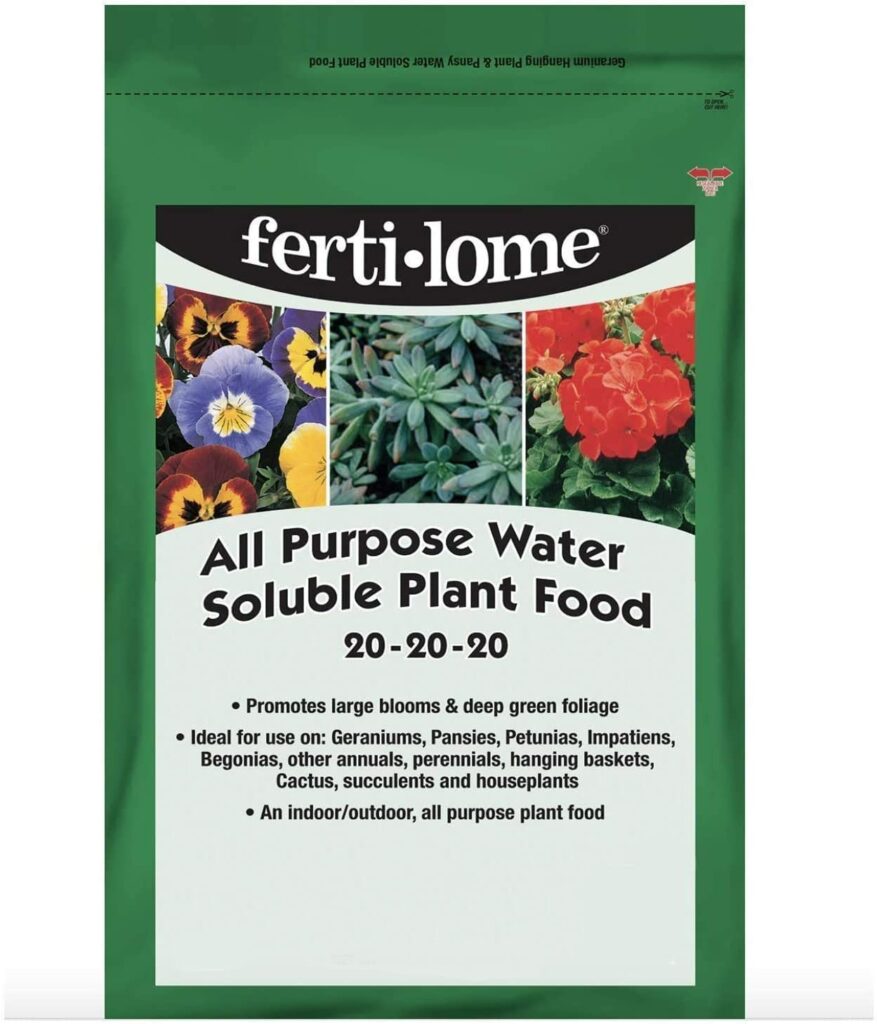
Professional gardeners and green thumbs know how reliable Fertilome Fertilizers are. They are among the first brands of fertilizers in the market that have become the gardening holy grail for a lot of people. It has an NPK ratio of 20-20-20 and comes in a water-soluble formula.
Home gardeners use this all-purpose fertilizer during soil preparation and for routine feeding during the growing season. It has a versatile formula that can feed indoor and outdoor plants. It is most efficient for:
- Geranium.
- Pansy.
- Begonia.
- Petunia.
- Impatiens.
- Annuals.
- Perennials.
- Gladiolus.
- Cactus.
- Succulents.
Fertilome may be considered ancient by some but this old dime hosts few but efficient ingredients, such as:
- Ammonium phosphate.
- Diammonium phosphate.
- Potassium chloride.
- Urea.
If you want something that has been tested by a lot of gardeners, you should consider Fertilome. It stays in the market because of its trademark efficiency that’s incomparable to the new brands in the market today.
Pros
- Promote large blooms and deep green foliage.
- Highly concentrated.
- Work best as a soil drench and foliar spray.
- Supplement for plants at the peak of the summer.
- The holy grail of most gardeners.
- Affordable.
Cons
- Synthetic fertilizer.
- Comes in a bag.
- No added nutrients.
10. Baicor Nutra Green All-Purpose Fertilizer
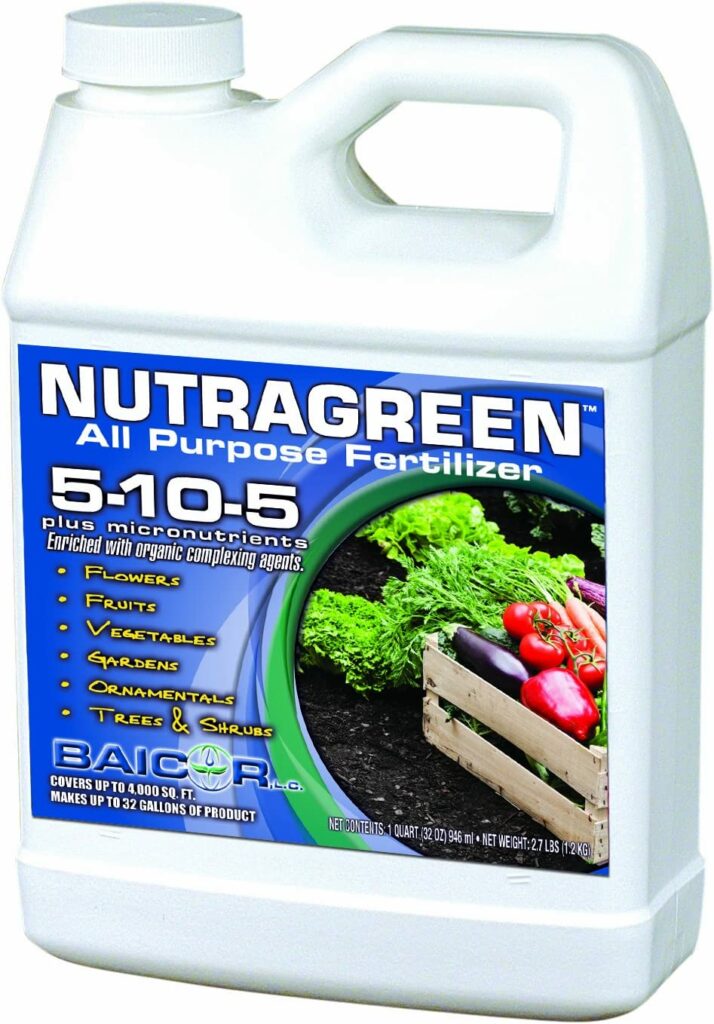
Baicor is another all-purpose fertilizer that you can use for maintaining the health and vigor of your petunia plants. It is a concentrated liquid fertilizer that has an NPK ratio of 5-10-5. It is a simple fertilizer that works just as effectively as other fertilizers on the market. Its leverage is on its price point which is more affordable than the rest.
Since it hosts a balanced amount of nutrients, it is ideal for a wide range of plants, shrubs, cactus, and trees. It contains synthetic ingredients and other natural agents.
However, the manufacturer doesn’t disclose a full list of its ingredients to the public. Nonetheless, it works well for a wide variety of plants that surprises homeowners.
Pros
- 100% organically chelated with micro & macronutrients.
- Helps with plant stress tolerance.
- Highly concentrated (1 oz. to a gallon of water/makes up to 32 gallons).
- Covers up to 4,000 sq. ft.
- Affordable.
- Easy to use.
- Easily absorbed by plants.
Cons
- Synthetic fertilizer.
- Incomplete fertilizer information.
14 Tips For Growing Healthy Petunias
Keep your petunias happy and filled with blooms by following these tips:
(1) Petunias need at least 5 to 6 hours of full sun. They are warm-loving plants and if placed in the shade, they will produce fewer blooms.
(2) It’s more important for petunias to have well-draining soil than a nutrient-rich one.
(3) During soil preparation, the ideal soil mix includes peat moss, compost, and manure. Make it at least 2 to 3 inches thick and work it on the soil reaching a depth of 8 to 10 inches.
These ingredients help break clumps of clay soil, give enough aeration to the roots, and adequate water retention for petunias. The ideal combination of the following ingredients makes up the best soil for petunias:
- 40% normal garden soil(sandy).
- 20% coco peat.
- 40% vermicompost or worm castings.
- 50g starter fertilizer (big pots)/25g (small pots).
(4) Add a starter fertilizer to the soil before transplanting petunias.
(5) Ideally, you can apply fertilizer every three weeks or monthly. Wave petunias, however, need weekly feeding to remain vigorous throughout the growing season.
(6) Slow-release fertilizers are ideal for container petunias but liquid or water-soluble fertilizers make the best options if you want to see immediate results.
(7) Petunias need deadheading to preserve their energy from removing spent flowers and to boost bloom production. It also prevents them from seeding which will stop bloom production.
(8) Transplant petunias when the soil has reached 60°F and the threat of frost has passed.
(9) Spacing is crucial for plants to avoid competition against moisture and nutrients. Spacing petunias should be based on their variety. Here’s how:
- Milliflora: 4 to 6 inches apart.
- Spreading: 11.2 feet apart.
- Grandiflora and multiflora: 12 inches apart.
(10) Some gardeners plant petunias close to each other to create a bushy effect on the pot.
(11) Newly transplanted petunias need to adjust to outdoor sun exposure and may require a screen to filter the harsh sun. You may place a thin sheet of cloth or net to help the seedlings withstand the heat.
(12) Pinch or trim Grandiflora and Multiflora petunias as soon as they reach six inches tall to encourage further bloom production. It is not advisable to pinch multiflora and wave petunias.
(13) Petunias prefer wider pots to deeper ones.
(14) Some gardeners use potassium fertilizer to boost the bloom development of petunias. They add one tablespoon of potassium, dilute it in water and apply it to the soil.
Final Thoughts
We hope that this post helped you discover the best fertilizers for petunias. Among the 10 options, we selected the following as the best among the rest:
Petunias are low-maintenance but a gentle boost from fertilizers will make you realize that they can do so much more. They are simply like humans who become more energetic and efficient when taking some vitamins.
You won’t regret fertilizing petunias because they are one of the most generous plants that provide a ton of flowers during the growing season.
Did you learn a lot from this post?
Share it with your friends. Also, share your experiences in growing petunias in the comments below. Who knows we might learn from each other’s gardening experiences.
Happy gardening!
